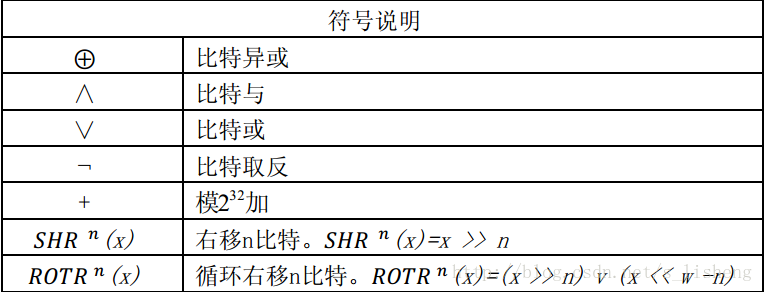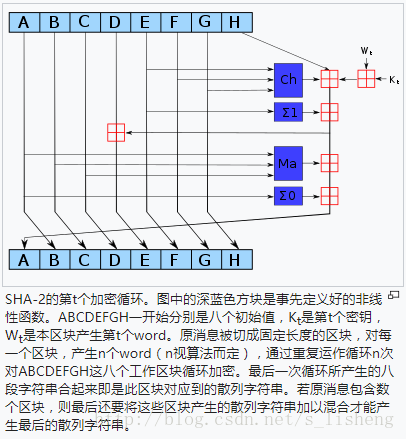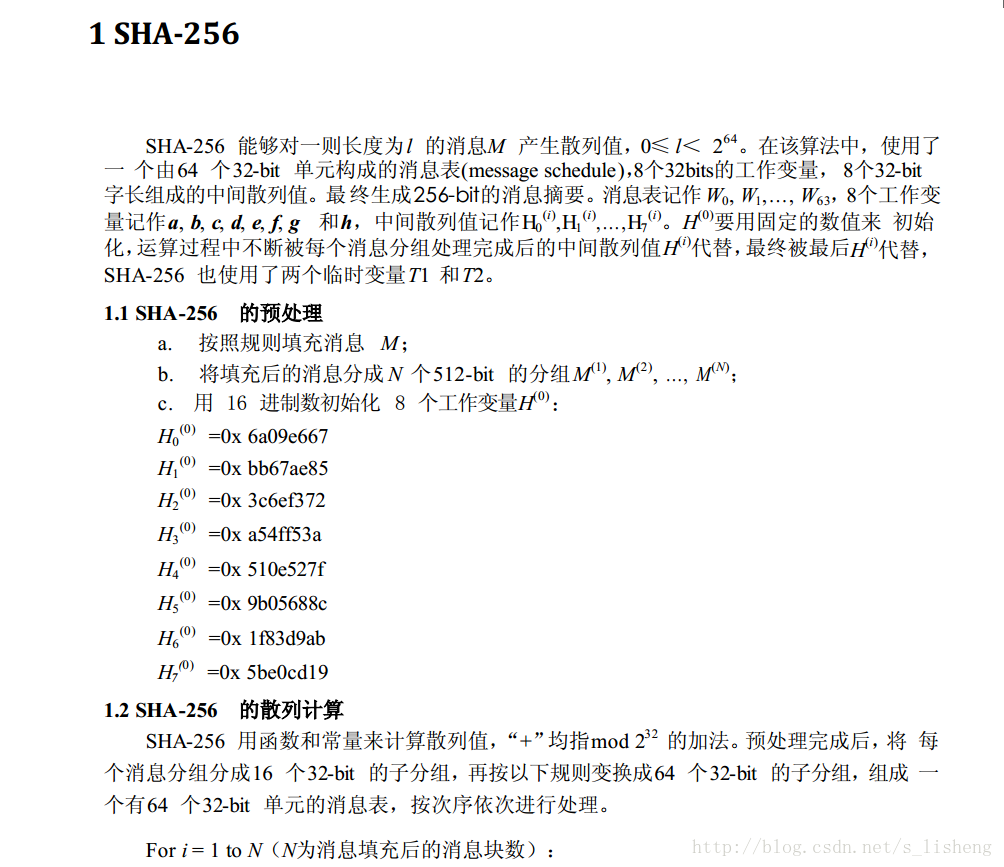问题导读
1.什么是SHA256?
2.SHA256计算包含哪些步骤?
3.SHA256计算包含哪些流程?

SHA256
SHA256属于SHA(Secure Hash Algorithm,安全哈希算法)家族一员。详细可参考:https://zh.wikipedia.org/wiki/SHA%E5%AE%B6%E6%97%8F。是SHA-2算法簇中的一类。对于小于264位的消息,产生一个256位的消息摘要。
SHA-256其计算过程分为两个阶段:消息的预处理和主循环。在消息的预处理阶段,主要完成消息的填充和扩展填充,将所有输入的原始消息转换为n个512比特的消息块,之后对每个消息块利用SHA256压缩函数进行处理。
下面几节讲述的是如何计算Hash值,目前还没有完全理解,列在这里是为了有个宏观的概念,大致知道是什么回事,以后需要的时候再深入学习理解。
SHA256计算步骤:
step1: 附加填充比特。对报文进行填充使报文长度 n≡(448 mod 512),填充比特数范围是1到512,填充比特串的最高位为1,其余位为0。(448=512-64,为了下面的64位)
step2 : 附加长度值。将用64-bit表示初始报文(填充前)的位长度附加在step1的结果后(低字节位优先)。
step3: 初始化缓存。使用一个256bit的缓存来存放该哈希函数的中间值及最终结果。
缓存表示为:A=0x6A09E667 , B=0xBB67AE85 , C=0x3C6EF372 , D=0xA54FF53A,
E=0x510E527F , F=0x9B05688C , G=0x1F83D9AB , H=0x5BE0CD19
step4: 处理512bit(16个字)报文分组序列。该算法使用了六种基本逻辑函数,由64步迭代运算组成。每步都以256-bit缓存值ABCDEFGH为输入,然后更新缓存内容。每步使用一个32-bit 常数值Kt 和一个32-bit Wt。Kt是常数值,在伪代码中有它的常数值定义。Wt是分组之后的报文,512 bit=32bit*16,也就是Wt t=1,2..16由该组报文产生。Wt t=17,18,..,64由前面的Wt按递推公式计算出来。Wt递推公式在下面的伪代码有。

step5 :所有的512-bit分组处理完毕后,对于SHA-256算法最后一个分组产生的输出便是256-bit的报文摘要。

SHA256计算流程
这里面公式太多,就直接截图了。

伪代码实现
基本就是把上面的计算流程用伪代码翻译了一遍。(摘自:https://en.wikipedia.org/wiki/SHA-2):
[mw_shl_code=bash,true]Note 1: All variables are 32 bit unsigned integers and addition is calculated modulo 2^32
Note 2: For each round, there is one round constant k and one entry in the message schedule array w, 0 ≤ i ≤ 63
Note 3: The compression function uses 8 working variables, a through h
Note 4: Big-endian convention is used when expressing the constants in this pseudocode,
and when parsing message block data from bytes to words, for example,
the first word of the input message "abc" after padding is 0x61626380
Initialize hash values://初始向量
(first 32 bits of the fractional parts of the square roots of the first 8 primes 2..19):
h0 := 0x6a09e667
h1 := 0xbb67ae85
h2 := 0x3c6ef372
h3 := 0xa54ff53a
h4 := 0x510e527f
h5 := 0x9b05688c
h6 := 0x1f83d9ab
h7 := 0x5be0cd19
Initialize array of round constants:
(first 32 bits of the fractional parts of the cube roots of the first 64 primes 2..311):
k[0..63] :=
0x428a2f98, 0x71374491, 0xb5c0fbcf, 0xe9b5dba5, 0x3956c25b, 0x59f111f1, 0x923f82a4, 0xab1c5ed5,
0xd807aa98, 0x12835b01, 0x243185be, 0x550c7dc3, 0x72be5d74, 0x80deb1fe, 0x9bdc06a7, 0xc19bf174,
0xe49b69c1, 0xefbe4786, 0x0fc19dc6, 0x240ca1cc, 0x2de92c6f, 0x4a7484aa, 0x5cb0a9dc, 0x76f988da,
0x983e5152, 0xa831c66d, 0xb00327c8, 0xbf597fc7, 0xc6e00bf3, 0xd5a79147, 0x06ca6351, 0x14292967,
0x27b70a85, 0x2e1b2138, 0x4d2c6dfc, 0x53380d13, 0x650a7354, 0x766a0abb, 0x81c2c92e, 0x92722c85,
0xa2bfe8a1, 0xa81a664b, 0xc24b8b70, 0xc76c51a3, 0xd192e819, 0xd6990624, 0xf40e3585, 0x106aa070,
0x19a4c116, 0x1e376c08, 0x2748774c, 0x34b0bcb5, 0x391c0cb3, 0x4ed8aa4a, 0x5b9cca4f, 0x682e6ff3,
0x748f82ee, 0x78a5636f, 0x84c87814, 0x8cc70208, 0x90befffa, 0xa4506ceb, 0xbef9a3f7, 0xc67178f2
Pre-processing://预处理阶段
begin with the original message of length L bits
append a single '1' bit
append K '0' bits, where K is the minimum number >= 0 such that L + 1 + K + 64 is a multiple of 512
append L as a 64-bit big-endian integer, making the total post-processed length a multiple of 512 bits
Process the message in successive 512-bit chunks:
break message into 512-bit chunks
for each chunk
create a 64-entry message schedule array w[0..63] of 32-bit words
(The initial values in w[0..63] don't matter, so many implementations zero them here)
copy chunk into first 16 words w[0..15] of the message schedule array
Extend the first 16 words into the remaining 48 words w[16..63] of the message schedule array:
for i from 16 to 63
s0 := (w[i-15] rightrotate 7) xor (w[i-15] rightrotate 18) xor (w[i-15] rightshift 3)
s1 := (w[i-2] rightrotate 17) xor (w[i-2] rightrotate 19) xor (w[i-2] rightshift 10)
w := w[i-16] + s0 + w[i-7] + s1
Initialize working variables to current hash value:
a := h0
b := h1
c := h2
d := h3
e := h4
f := h5
g := h6
h := h7
Compression function main loop://压缩函数主循环
for i from 0 to 63
S1 := (e rightrotate 6) xor (e rightrotate 11) xor (e rightrotate 25)
ch := (e and f) xor ((not e) and g)
temp1 := h + S1 + ch + k + w
S0 := (a rightrotate 2) xor (a rightrotate 13) xor (a rightrotate 22)
maj := (a and b) xor (a and c) xor (b and c)
temp2 := S0 + maj
h := g
g := f
f := e
e := d + temp1
d := c
c := b
b := a
a := temp1 + temp2
Add the compressed chunk to the current hash value:
h0 := h0 + a
h1 := h1 + b
h2 := h2 + c
h3 := h3 + d
h4 := h4 + e
h5 := h5 + f
h6 := h6 + g
h7 := h7 + h
Produce the final hash value (big-endian):
digest := hash := h0 append h1 append h2 append h3 append h4 append h5 append h6 append h7[/mw_shl_code]
摘自:
http://blog.csdn.net/s_lisheng/article/details/77937202
|
 /2
/2 